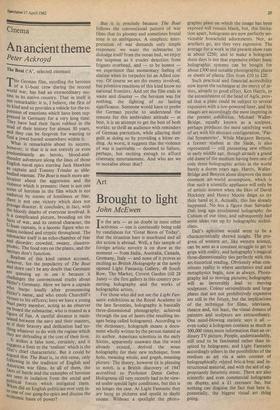Cinema
An ancient theme
Peter Ackroyd
The Boat (`A', selected cinemas)
This German film, extolling the heroism of a U-boat crew during the second world war, has had an extraordinary suc- cess in its native country. That in itself is not remarkable: it is, I believe, the first of its kind and so provides a vehicle for the ex- pression of emotions which have been sup- pressed in Germany for a very long time. They have had their faces rubbed in the mud of their history for almost 30 years, and they can be forgiven for wanting to find a jewel buried somewhere within it. What is remarkable about its success, however, is that it is not entirely or even predominantly an heroic, blood-and- thunder adventure along the lines of those English naval epics starring Jack Hawkins as captain and Tommy Trinder as able- bodied seaman. The Boat is much more am- bivalent about the aggression and the violence which it presents: there is not one scene of heroism in the film which is not undercut by scenes of loneliness or fear, there is not one victory which does not Presage disaster. It concludes, in fact, with the bloody deaths of everyone involved. It is a complicated picture, brooding on the facts of war, and its central character, the U-boat captain, is a laconic figure who re- mains isolated and cryptic throughout. The submarine itself is an echo-chamber of fear and disorder: crowded, sweaty, claustro- Phobic. The food rots on the plates, and the latrines don't function. Realism of this kind cannot account, however, for the popularity of The Boat and there can't be any doubt that Germans are queuing up to see it because it challenges the conventional truths about Hitler's Germany. Here we have a captain who burps loudly after pronouncing Hitler's name, and who extols Churchill's virtues to his officers; here we have a young Nazi party member, acting as an observer on board the submarine, who is treated as a figure of fun. A careful distance is main- tained between the navy and their masters, as if their bravery and dedication had no- thing whatever to do with the regime which they are defending at the cost of their lives. It strikes a false note, certainly, and it suggests a limit to the 'realism' which is the film's chief characteristic. But it could be argued that The Boat is, in this sense, only following in the tradition of English and American war films. In all of them, the facts of battle and the examples of heroism are seen in isolation from the social and Political forces which instigated them. When did an English politician ever step in- to one of our gung-ho epics and discuss the economic bases of power? But it is precisely because The Boat follows the conventional pattern of war films that its gloomy and sometimes brutal tone is so ambiguous. A simplistic inter- pretation of war demands only simple responses: we want the submarine to dislodge itself from the ocean bed, we enjoy the suspense as it evades detection from frigates overhead, and — to be honest — we experience that momentary feeling of elation when its torpedos hit an Allied con- voy. Of course we are the enemy involved, but primitive reactions of this kind know no national frontiers. And yet the film ends in waste and disaster — the heroism was for nothing, the fighting of no lasting significance. Someone would have to probe the German psyche to understand the reasons for this ambivalent attitude — at best, it is an attempt to get the best of both worlds: to thrill an audience with reminders of German patriotism, while allaying their guilt at doing so by providing a bitter en- ding. At worst, it suggests that the violence of war is inevitable — doomed to failure, perhaps, but exciting enough to afford cinematic entertainment. And who are we to moralise about that?


































 Previous page
Previous page